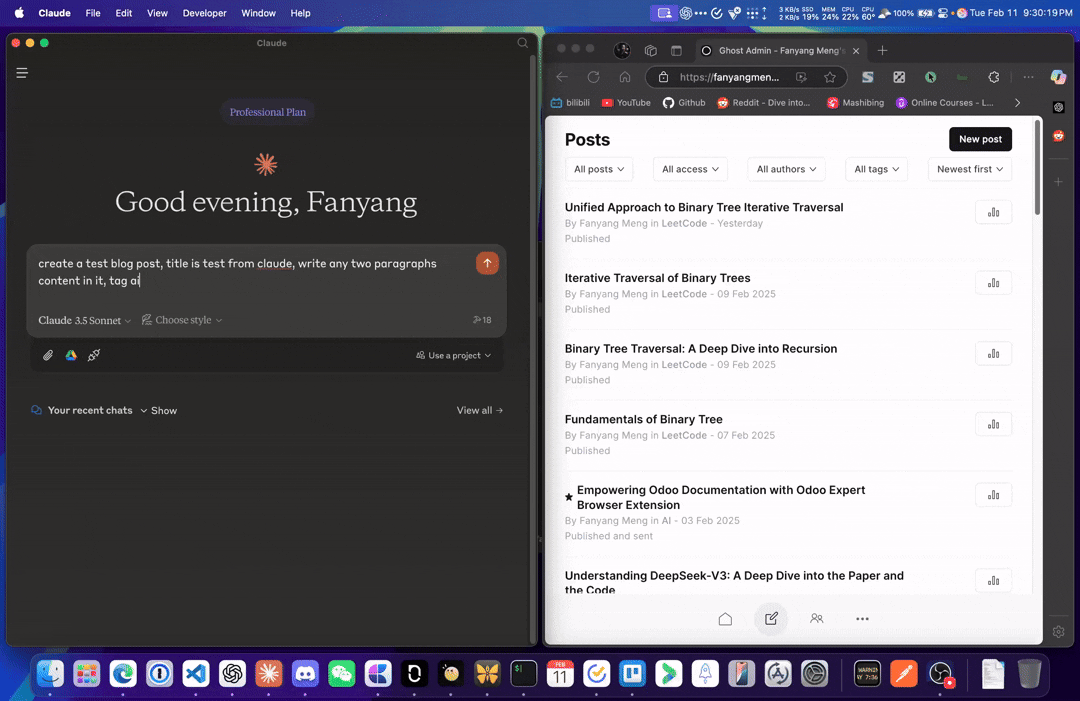The Ghost MCP Server allows you to interact with and manage a Ghost CMS blog through LLM interfaces like Claude using the Model Context Protocol (MCP).
Posts: Create, read, update, delete, and search posts with filtering options and both fuzzy/exact matching
Members: Add, edit, delete, and manage member details and subscriptions
Newsletters: Create, update, and manage newsletters, including email settings
Offers: Create, update, and delete promotional offers for subscription tiers
Invites: Generate and manage staff user invites
Roles: View roles and permissions within the Ghost admin
Tags: Create, update, delete, and manage content categorization tags
Tiers: Create, update, and delete subscription tiers and plans
Users: Add, update, and delete admin users and staff accounts
Webhooks: Create, update, and delete webhooks for automated notifications
Advanced Features: Supports pagination, filtering, and detailed error handling via
GhostError
Provides secure and comprehensive access to Ghost CMS blogs, enabling management of posts, users, members, tiers, offers, and newsletters through LLM interfaces
Click on "Install Server".
Wait a few minutes for the server to deploy. Once ready, it will show a "Started" state.
In the chat, type
@followed by the MCP server name and your instructions, e.g., "@Ghost MCP Servershow me the latest 5 posts"
That's it! The server will respond to your query, and you can continue using it as needed.
Here is a step-by-step guide with screenshots.
Ghost MCP Server
‼️ Important Notice: Python to TypeScript Migration
I've completely rewritten the Ghost MCP Server from Python to TypeScript in this v0.1.0 release. This major change brings several benefits:
Simplified installation: Now available as an NPM package (@fanyangmeng/ghost-mcp)
Improved reliability: Uses the official @tryghost/admin-api client instead of custom implementation
Better maintainability: TypeScript provides type safety and better code organization
Streamlined configuration: Simple environment variable setup
Breaking Changes
Python dependencies are no longer required
Configuration method has changed (now using Node.js environment variables)
Docker deployment has been simplified
Different installation process (now using NPM)
Please see the below updated documentation for details on migrating from the Python version. If you encounter any issues, feel free to open an issue on GitHub.
A Model Context Protocol (MCP) server for interacting with Ghost CMS through LLM interfaces like Claude. This server provides secure and comprehensive access to your Ghost blog, leveraging JWT authentication and a rich set of MCP tools for managing posts, users, members, tiers, offers, and newsletters.

Related MCP server: Ghost MCP Server
Features
Secure Ghost Admin API requests with
@tryghost/admin-apiComprehensive entity access including posts, users, members, tiers, offers, and newsletters
Advanced search functionality with both fuzzy and exact matching options
Detailed, human-readable output for Ghost entities
Robust error handling using custom
GhostErrorexceptionsIntegrated logging support via MCP context for enhanced troubleshooting
Usage
To use this with MCP clients, for instance, Claude Desktop, add the following to your claude_desktop_config.json:
Available Resources
The following Ghost CMS resources are available through this MCP server:
Posts: Articles and content published on your Ghost site.
Members: Registered users and subscribers of your site.
Newsletters: Email newsletters managed and sent via Ghost.
Offers: Promotional offers and discounts for members.
Invites: Invitations for new users or staff to join your Ghost site.
Roles: User roles and permissions within the Ghost admin.
Tags: Organizational tags for posts and content.
Tiers: Subscription tiers and plans for members.
Users: Admin users and staff accounts.
Webhooks: Automated event notifications to external services.
Available Tools
This MCP server exposes a comprehensive set of tools for managing your Ghost CMS via the Model Context Protocol. Each resource provides a set of operations, typically including browsing, reading, creating, editing, and deleting entities. Below is a summary of the available tools:
Posts
Browse Posts: List posts with optional filters, pagination, and ordering.
Read Post: Retrieve a post by ID or slug.
Add Post: Create a new post with title, content, and status.
Edit Post: Update an existing post by ID.
Delete Post: Remove a post by ID.
Members
Browse Members: List members with filters and pagination.
Read Member: Retrieve a member by ID or email.
Add Member: Create a new member.
Edit Member: Update member details.
Delete Member: Remove a member.
Newsletters
Browse Newsletters: List newsletters.
Read Newsletter: Retrieve a newsletter by ID.
Add Newsletter: Create a new newsletter.
Edit Newsletter: Update newsletter details.
Delete Newsletter: Remove a newsletter.
Offers
Browse Offers: List offers.
Read Offer: Retrieve an offer by ID.
Add Offer: Create a new offer.
Edit Offer: Update offer details.
Delete Offer: Remove an offer.
Invites
Browse Invites: List invites.
Add Invite: Create a new invite.
Delete Invite: Remove an invite.
Roles
Browse Roles: List roles.
Read Role: Retrieve a role by ID.
Tags
Browse Tags: List tags.
Read Tag: Retrieve a tag by ID or slug.
Add Tag: Create a new tag.
Edit Tag: Update tag details.
Delete Tag: Remove a tag.
Tiers
Browse Tiers: List tiers.
Read Tier: Retrieve a tier by ID.
Add Tier: Create a new tier.
Edit Tier: Update tier details.
Delete Tier: Remove a tier.
Users
Browse Users: List users.
Read User: Retrieve a user by ID or slug.
Edit User: Update user details.
Delete User: Remove a user.
Webhooks
Browse Webhooks: List webhooks.
Add Webhook: Create a new webhook.
Delete Webhook: Remove a webhook.
Each tool is accessible via the MCP protocol and can be invoked from compatible clients. For detailed parameter schemas and usage, see the source code in
src/tools/.
Error Handling
Ghost MCP Server employs a custom GhostError exception to handle API communication errors and processing issues. This ensures clear and descriptive error messages to assist with troubleshooting.
Contributing
Fork repository
Create feature branch
Commit changes
Create pull request
License
MIT